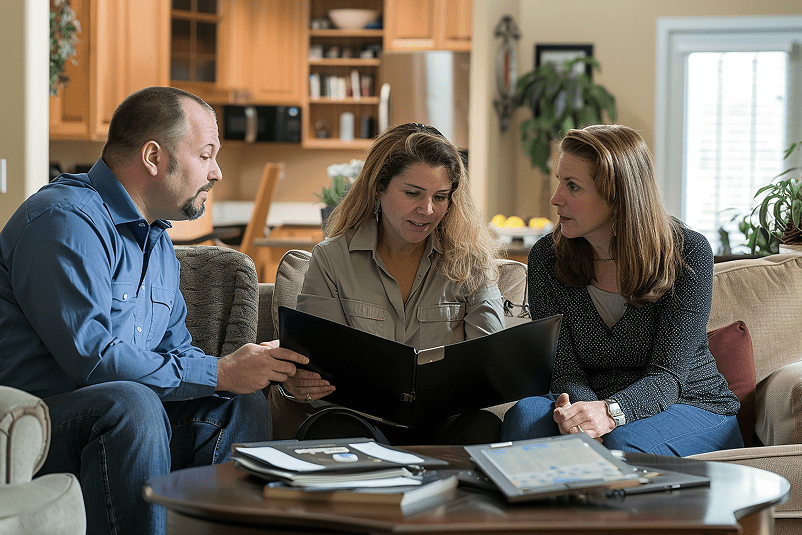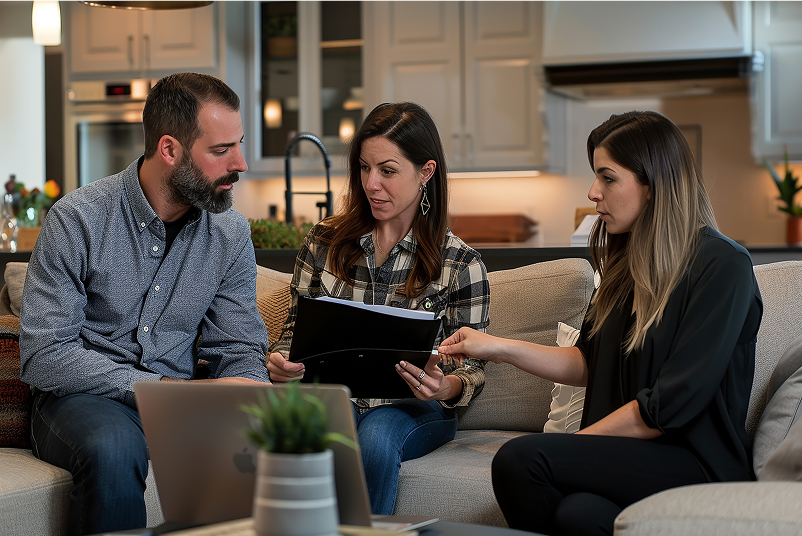How to Secure a mortgage with a default.
Securing a mortgage with a default on your credit file can seem challenging, but it’s not impossible. A default indicates that you failed to pay a debt, and this can raise concerns for potential lenders. Defaults are a common reason for declining a mortgage application, especially by high-street lenders.
Most high-street lenders have stricter guidelines and are more likely to decline a mortgage application with defaults automatically. Additionally, most high-street lenders will automatically decline a mortgage application with recent defaults, making it even more challenging for borrowers in such situations.
Most lenders will view any defaults on secured loans or home loan payments as very serious.
However, many lenders offer mortgages to individuals with defaults, especially if the default occurred some time ago or was for a smaller amount. In this guide, we’ll explain how you can still get a mortgage with a default on your credit report, which lenders are more flexible, and what steps you can take to improve your chances.
What Is a Default and How Does It Affect Your Mortgage Chances?
A default happens when you miss several payments on a debt, such as a loan or credit card, and the lender formally marks your account as unpaid. A default happens when your account with a creditor or lender is closed because you’ve repeatedly missed payments. Creditors usually register a default after you’ve missed payments for three to six months. This normally shows on your credit report as 6 consecutive missed payments (status 6).
This information is recorded on your credit file and stays there for six years, even if you eventually repay the debt. Defaults remain on your credit file for six years, impacting your ability to secure credit, including mortgages. Once a default is removed from your credit report, it cannot be re-registered even if the money owed hasn’t been paid back.
When applying for a mortgage with defaults, lenders will carefully review your credit report to assess your reliability as a borrower. A default can suggest financial instability, which may cause traditional lenders to view you as a higher risk. Most lenders view defaults on secured loans or home loan payments as very serious, as these types of defaults indicate a higher level of financial risk. Lenders typically charge a higher interest rate for mortgages if the borrower has a default on their credit history.
However, many specialist lenders understand that defaults don’t always reflect long-term financial behaviour and are willing to offer mortgages to those with imperfect credit histories. Specialist lenders may accept multiple defaults on an application, depending on age and value. Mortgage lenders will generally accept applicants with up to two defaults even if they are within the past two years. Most lenders will generally accept multiple defaults as long as there aren’t too many within a certain period of time.
Can You Get a Mortgage with a Default?
Yes, you can still get a mortgage with a default, but it may come with certain conditions. Lenders will consider:
- The age of the default: Older defaults (over two to three years old) are often viewed more leniently by lenders. If the default is recent, securing a mortgage will be more challenging, but not impossible. The longer you wait after receiving a default, the better your chances of getting a mortgage.
High Street Lenders who will offer a mortgage with defaults
| Lender | Default Criteria | Time Since Default | Max LTV | Additional Notes |
| Barclays | Accepts up to 3 satisfied defaults totaling £200 or less. | Defaults must be older than 12 months. | Up to 90% | Requires a clean credit record for at least 6–12 months before application. Defaults must be satisfied. |
| Santander | Allows defaults up to £300, none registered in the last 12 months. | Defaults must be older than 12 months. | Up to 90% | Emphasizes recent financial stability; defaults should be satisfied. |
| Nationwide | Accepts satisfied defaults up to £250. | Defaults must be older than 12 months. | Up to 90% | Requires a clean credit record for at least 6–12 months before application. Defaults must be satisfied. |
| TSB | Allows up to 2 defaults totaling £500; none over £100 in the last 12 months. | Defaults must be older than 12 months. | Up to 90% | Emphasizes recent financial stability; defaults should be satisfied. |
| HSBC | Does not accept any defaults registered in the last 3 years. | Defaults must be older than 3 years. | Up to 90% | Requires a clean credit record for at least 6–12 months before application. Defaults must be satisfied. |
| Leeds Building Society | Accepts one satisfied default within the last 3 years, not exceeding £500; up to four satisfied defaults over 3 years ago, not exceeding £20,000 in total. | Defaults must be satisfied; specific timeframes apply. | Up to 95% | Unsatisfied defaults are not acceptable. Emphasizes the importance of satisfying defaults and maintaining a clean credit record for at least 6–12 months before application. |
| Loughborough Building Society | Accepts applications with unsatisfied defaults in areas such as mail orders, utility bills, bank accounts, car insurance, and telecommunications. | No specific timeframe; recent defaults considered. | Up to 95% | Revised lending rules to support first-time buyers with imperfect credit histories. These changes are implemented in their systems without requiring further explanation from applicants. |
Unsatisfied – This shows the default registered on the credit report but hasn’t been paid off and cleared.
Satisfied – Where the default is registered and the amount has been paid and cleared. A satisfied default shows lenders that the borrower is taking steps to fix their finances.
The amount of the default:
Defaults for smaller amounts are typically less concerning to lenders. Defaults on smaller amounts are often viewed more leniently than defaults on larger debts. A default for a large sum of money may raise more red flags. Defaults on smaller amounts are often viewed more leniently than defaults on larger debts, as they are perceived as less indicative of financial instability.
Defaults for mobile phone bills and mail-order accounts are usually seen as less serious and may be ignored by some lenders. If a default gets sold to a collection agency, it might be re-registered as a new debt, which could further complicate your credit profile.
While a default can limit your mortgage options, many lenders offer products designed for those with bad credit ratings, including defaults.
Specialist Lenders who Offer Mortgages to People with Defaults?
Some lenders specialise in offering mortgages to people with poor credit histories, including defaults. These lenders often have more flexible criteria than high street banks. Here are a few specialist mortgage lenders that are more accepting of defaults:
| Lender | Default Criteria | Time Since Default | Max LTV | Additional Notes |
| Bluestone Mortgages | Accepts multiple unsatisfied defaults; focuses on recent financial behavior. | No minimum; recent defaults considered. | Up to 90% | Manual underwriting; no credit scoring. Suitable for applicants with complex credit histories. |
| Pepper Money | Accepts defaults registered over 6 months ago; unsatisfied defaults considered. | 6 months or more. | Up to 85% | Tiered product range based on severity and recency of credit issues. Flexible criteria for self-employed applicants. |
| Kensington Mortgages | Accepts satisfied defaults over 12 months old; unsatisfied defaults considered on a case-by-case basis. | 12 months or more. | Up to 90% | Manual underwriting; considers applicants with complex income structures. |
| The Mortgage Lender | Accepts defaults over 12 months old; unsatisfied defaults considered depending on circumstances. | 12 months or more. | Up to 85% | Flexible approach to adverse credit; suitable for applicants with multiple credit issues. |
| Foundation Home Loans | Accepts satisfied defaults over 24 months old; unsatisfied defaults considered on a case-by-case basis. | 24 months or more. | Up to 80% | Specializes in complex income and credit profiles; suitable for self-employed applicants. |
| Aldermore | Accepts satisfied defaults over 12 months old; unsatisfied defaults considered depending on circumstances. | 12 months or more. | Up to 85% | Manual underwriting; considers applicants with complex income structures. |
| Precise Mortgages | Accepts satisfied defaults over 24 months old; unsatisfied defaults considered on a case-by-case basis. | 24 months or more. | Up to 85% | Specializes in complex income and credit profiles; suitable for self-employed applicants. |
| Shawbrook Bank | Accepts satisfied defaults over 12 months old; unsatisfied defaults considered depending on circumstances. | 12 months or more. | Up to 85% | Manual underwriting; considers applicants with complex income structures. |
| Atom Bank | Accepts defaults over 12 months old; unsatisfied defaults considered on a case-by-case basis. | 12 months or more. | Up to 90% | Digital bank offering near-prime mortgages; suitable for applicants with minor credit issues. |
| Vida Homeloans | Accepts satisfied defaults over 24 months old; unsatisfied defaults considered depending on circumstances. | 24 months or more. | Up to 85% | Specializes in complex income and credit profiles; suitable for self-employed applicants. |
Tips for Getting a Mortgage with a Default
If you’re looking to secure a mortgage with a default on your credit file, follow these steps to improve your chances of approval:
1. Work with a Specialist Mortgage Broker
A specialist mortgage broker can help you find lenders who are more willing to offer mortgage deals to people with defaults. Brokers have access to a wider range of lenders, including those who don’t advertise directly to the public, and can guide you to the best options based on your specific situation.
2. Checking your credit report
This would give you and your broker the information that the lender will work with. This will show exact dates of registered defaults, the amounts owed and who the creditor was. This is vital as a broker would be able to check this information against lenders criteria and find the best deal based on your circumstances.
3. Improve Your Credit Score
Even with a default, improving your overall credit score can increase your chances of getting approved for a mortgage. Ensure you are making all current payments on time, keep your credit utilisation low, and avoid taking on any new debt in the months leading up to your mortgage application. Repairing your credit score involves being registered on the electoral roll and paying financial commitments on time.
4. How Much Deposit?
A larger deposit (10-20%) reduces the risk to the lender and can improve your chances of being approved for a mortgage with a default. It also opens the door to better mortgage rates, as lenders are more willing to work with higher-risk borrowers who can contribute a significant deposit. Lenders typically require a larger deposit if a default is recent or unsatisfied, often ranging from 15% to 20%.
5. Demonstrate Financial Stability
Lenders are more likely to approve your mortgage application if you can demonstrate financial stability since the default occurred. Evidence of a steady income, savings, and responsible credit use can offset the negative impact of the default on your record.
6. Consider a Joint Mortgage
If your partner or co-borrower has a strong credit history, applying for a joint mortgage may improve your chances of approval. Lenders will consider both applicants’ credit histories, and a partner’s stronger financial standing could offset the impact of your default.
How Long After a Default Can You Get a Mortgage?
The age of the default plays a significant role in your ability to secure a mortgage. Here’s a general guideline on how lenders view defaults based on their age:
- Within 12 months: It will be challenging to find a lender willing to offer a bad credit mortgage if your default occurred within the past year. Some specialist lenders may consider it, but expect higher interest rates and stricter terms.
- 1-2 years old: Lenders may be more flexible after 12 months, especially if the default has been satisfied. Specialist lenders will likely be your best option.
- Over 2 years old: Defaults over two years old are viewed more leniently by many lenders. Provided the rest of your financial profile is strong, you may be able to secure a mortgage with more favourable terms.
- Over 6 years old: Defaults drop off your credit report after six years. Once this happens, they will no longer affect your mortgage application. A default stays on your credit file for six years from when it was first issued. Most specialist mortgage lenders can potentially ignore satisfied defaults registered over three years ago.
Defaults with additional credit issues
Additional credit issues with defaults will increase the chances of a decline in a mortgage application. This is why it’s important to get a credit report before you submit a mortgage application. The main credit reference agencies that all lenders use is as follow:
· Experian
· Equifax
· Transunion
Checking your credit reports can help identify when a default was first recorded and ensure all information is correct.
Check my file report combines Experian, Equifax and Transunion. This would be the preferred report to use due to all the relevant information all on one report.
More serious credit issues such as CCJ’s, IVA’s and Bankruptcy makes it more challenging but not impossible. Speak to a specialist mortgage advisor who has experience in bad credit mortgages.
Don’t Let a Default Stop You from Getting a Mortgage
While getting a mortgage with a default can be more challenging, it’s far from impossible. Many lenders are willing to work with individuals who have had defaults, especially if they occurred some time ago or have been satisfied.
By improving your credit score, saving for a larger deposit, and working with a specialist broker who can provide personalised mortgage advice can significantly improve your chances of securing a mortgage with favourable terms.
Whether you’re a first-time buyer or looking to move home, don’t let a past default hold you back from achieving your property goals. With the right approach and lender, you can still get the mortgage you need to buy your dream home.
Get help from an experienced mortgage broker.
You can speak to one of our specialist mortgage brokers who would be able to guide you through the process. They will advise if there is a lender available and the maximum loan amount based on your circumstances. We are a whole of market mortgage brokerage with access to all lenders. Call us on 01332 470400 or complete the form with your details for us to give you a call back.
Why Work with Option Finance for Bad Credit Mortgages?
At Option Finance, we specialise in mortgages for complex credit scenarios. Our team works with all major bad credit lenders and has access to exclusive deals that aren’t available on the high street.
Understanding one’s credit report from a credit reference agency can help in securing a mortgage.
Over 20 years of experience
Full market access to specialist lenders
Fast, honest, and personalised mortgage advice
Expert help with complex or recent credit issues
Showing our favourite reviews

Always attentive, helpful and efficient
Jonathan, 27 Jan 2025

Best Mortgage Broker in the UK!
Liam, 26 Nov 2024

Ben was really helpful in helping me…
George, 28 Aug 2024
FAQs
Can I get a mortgage if I have a default on my credit file?
Yes, it is possible. While most high street lenders are strict, many specialist lenders are more flexible and will consider applications with one or more defaults—especially if they are older or have been satisfied.
What is a default, and how does it affect my mortgage application?
A default is recorded when you miss several payments on a credit account, usually after 3–6 months of non-payment. It stays on your credit report for 6 years and can make lenders more cautious. That said, not all defaults are treated equally—smaller or older defaults may have less impact.
What’s the difference between a satisfied and unsatisfied default?
- Satisfied default: The debt has been fully repaid. This looks better to lenders.
- Unsatisfied default: The debt hasn’t been paid. This signals ongoing risk and will limit lender options.
Many lenders prefer satisfied defaults, but some specialist lenders will still consider applications with unsatisfied ones on a case-by-case basis.
How long after a default can I apply for a mortgage?
It depends on the lender. Here’s a general guide:
- 0–12 months: Very few lenders will approve. Expect high interest rates and tight criteria.
- 12–24 months: Some specialist lenders may consider your application.
- Over 2 years: More options open up—especially if the default is satisfied and your recent credit behaviour is positive.
- Over 6 years: The default will be removed from your credit report and won’t affect your application.
How many defaults can I have and still get approved?
Some lenders will accept 1–2 defaults, even if they’re recent. Others may allow multiple defaults, especially if:
- They are over 12–24 months old
- They are for smaller amounts
- Your recent financial behaviour is stable
Each lender has their own rules, so speaking to a broker is key.
Do the size and type of default matter?
Yes.
- Smaller defaults (e.g. mobile phone or mail-order accounts) are often viewed more leniently.
- Larger defaults or defaults on secured loans raise more concern.
- Utility and communication bill defaults may be accepted by some lenders, even if unsatisfied.
Will I need a bigger deposit if I have a default?
Most likely, yes. Lenders typically ask for a 10%–25% deposit, depending on how recent and severe the default is. A larger deposit reduces the lender’s risk and can improve your mortgage terms.
What can I do to improve my chances of getting approved?
- Work with a specialist broker who understands lender criteria
- Check your credit report via Checkmyfile or Experian
- Satisfy any outstanding defaults if possible
- Build up a bigger deposit
- Avoid new credit applications before applying
- Maintain a stable income and clean credit history after the default
Will my interest rate be higher because of a default?
Yes, in most cases. Lenders charge higher rates to account for the added risk. But as your credit history improves and time passes, you can remortgage later for a better rate.
Should I apply alone or with someone else?
If your partner or co-borrower has good credit, a joint mortgage may boost your chances. Their stronger financial profile can help balance out your default.
Can I still get a mortgage with other issues like CCJs or IVAs?
Yes, though it will be more difficult. A default combined with CCJs or an IVA narrows your options, but some specialist lenders may still help. It’s crucial to speak with an experienced broker who can guide you.
Why use Option Finance for a default mortgage?
We’ve helped hundreds of clients secure mortgages after defaults, CCJs, and other credit challenges.
Access to the full market, including lenders who don’t advertise publicly
Manual case reviews (not just automated decisions)
Expert advice based on your exact credit history
Friendly, no-pressure service from start to finish
Ready to Take the First Step?
Whether you’re a first-time buyer, remortgaging, or moving home, bad credit doesn’t have to hold you back.
Understanding credit scoring can help you prepare for a mortgage application. You can speak to one of our specialist mortgage brokers who would be able to guide you through the process. They will advise if there is a lender available and the maximum loan amount based on your circumstances. We are a whole of market mortgage brokerage with access to all lenders.
































